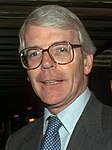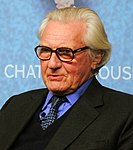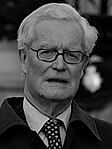Conservative Party (UK) leadership election, 1990
|
|
|||||||||||||||||||||||||||||||||||||||||||||||
|
|||||||||||||||||||||||||||||||||||||||||||||||
|
|||||||||||||||||||||||||||||||||||||||||||||||
|
|||||||||||||||||||||||||||||||||||||||||||||||
The 1990 Conservative Party leadership election in the United Kingdom took place on 20 November 1990 following the decision of former Defence and Environment Secretary Michael Heseltine to challenge Margaret Thatcher, the incumbent Prime Minister, for leadership of the Conservative Party.
Thatcher failed to win outright under the terms of the election in the first ballot, and was persuaded to withdraw from the second round of voting. She announced her resignation on the morning of 22 November 1990, ending more than 15 years as Conservative leader and 11 years as prime minister.
Discontent with Thatcher's leadership of the party had been growing over the latter years of her tenure. In December 1989, she had been challenged for the leadership for the first time since her election in 1975, by the little known 69-year-old backbencher MP Sir Anthony Meyer. Thatcher faced no serious threat of losing to this stalking horse challenger, but her political credibility was undermined by the fact that 60 members of the parliamentary Conservative party had not supported her, 33 voting for Meyer, 24 spoiling their ballot papers, and three not voting at all.
Throughout 1990, the popularity both of Thatcher and of the Conservative government waned considerably. Whereas in 1987 Thatcher had presided over an economic boom, in 1989 and 1990 interest rates had to be raised to 15% to cool inflation, which was now pushing 10%, and by late 1990 the economy was in the first stages of recession. The introduction of the deeply unpopular Community Charge (which opponents labelled the "Poll Tax") had been greeted with widespread non-payment and even a riot in Trafalgar Square in March 1990. Labour had held a lead in most of the opinion polls since mid-1989, and at the height of the Poll tax controversy, at least one opinion poll had shown Labour support above 50%, a lead of more than 20 points over the Tories, although the Conservative parliamentary majority still stood at nearly 100 seats.
...
Wikipedia




